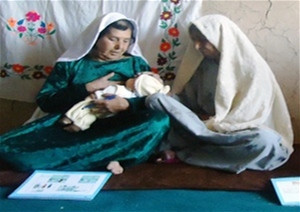
A community health worker provides basic information on newborn care to Miriam from Bamyan Province.
USAID/BASICS
Helping protect the lives of Afghan babies born at home.
Through efforts in many small villages and communities, CHWs are reducing the unnecessary newborn deaths that occur throughout Afghanistan.
15 SEPTEMBER 2010 | BAMYAN PROVINCE, AFGHANISTAN
Miriam has only three children; although she has just given birth to her sixth child, two other infants died within days of birth. However, this birth was different from the previous ones. Miriam and her female relatives have learned from the local female community health worker (CHW) about the importance of keeping the baby warm.
The old custom of washing a newborn soon after birth is dangerous because the baby can easily get sick. Instead, a baby should be gently dried with a towel and placed next to the mother’s skin. Washing should wait until later.
“Until I received training about the care of newborn babies, I followed our old customs. I did not realize how important it is to keep the baby warm after birth,” said a CHW. “Placing the newborn on the mother’s skin is so simple, and the mothers like it, too.”
With nearly nine out of 10 births in Afghanistan still occurring in the home, USAID’s Basic Support for Institutionalizing Child Survival (BASICS) project is training local health workers in essential maternal and newborn care. They then teach pregnant mothers and their families the simple but important things they can do to preserve the lives of newborns.
Although health outcomes have improved since 2002, Afghanistan remains a country with some of the poorest health indicators worldwide. Afghanistan has one of the highest mortality rates in the world: about one in five children die before the age of five. Approximately 80 percent of women in rural Afghanistan give birth outside a health facility without a skilled birth provider. Consequently, teaching basic newborn care along with other basic health skills to CHWs is a vital part of the Ministry of Public Health’s (MoPH) national strategy.
Together, USAID and the MoPH are helping save the lives of babies born in rural homes by ensuring that CHWs know the key newborn care skills to share with pregnant mothers and their families. Families can be more confident and better prepared for their babies’ births.







Comment
Make a general inquiry or suggest an improvement.